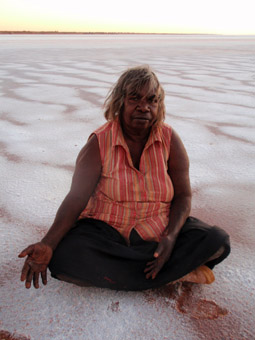rewind, recall, recover
kirsten krauth: bentley dean & martin butler, contact

Yuwali on location
courtesy Contact Films
Yuwali on location
SINCE FIRST APPEARING ON THE ABC’S RACE AROUND THE WORLD SERIES IN 1997 (THAT ALSO THREW UP THE GREAT SATIRIST JOHN SAFRAN), BENTLEY DEAN, USUALLY IN COLLABORATION WITH ANOTHER DIRECTOR, HAS MADE A SLATE OF UNFLINCHING DOCUMENTARIES FOCUSING ON SOCIAL JUSTICE ISSUES AROUND THE GLOBE.
In 2001 he began working for SBS’s Dateline and became captivated by South America (directing Anatomy of a Coup in Venezuela and The Siege in Peru) before turning his lens back to Australian issues with the AFI Award-winning The President Versus David Hicks and, one of my favourite documentaries of recent years, A Well Founded Fear, which follows a number of refugees who, rejected by the Australian government, are forced to return to their home countries, often under threat of violence or possible death.
Dean’s latest film, Contact, with co-director Martin Butler, is the story of an Aboriginal woman Yuwali and her Martu tribe of 20 women and children, the last remaining clan living in the isolated Percival Lakes, who in 1964 are ‘discovered’ when they come into contact with white men for the first time.
These “white devils”, as Yuwali calls them, are getting ready to launch a rocket from Woomera and plan to use the Martu land as a “dump area” for crash debris, believing it to be uninhabited (terra nullius, yet again). Terry Long and Walter Macdougall, native welfare patrol officers, were appointed to scour the deserts, looking for any signs of life, armed with cameras. Long says, “We didn’t expect to find anyone out there”, but they soon discover middens and traces of fires and the search is on. The directors have been busy in the ABC archives unearthing amazing footage: the women’s first shy and fearful approach is captured on film (and in photographs); but there are also also preparations for the rocket launch—enormous wide load shipping containers carried on trucks through small country towns and into the bush.
Dean beautifully evokes the stark contrast between a civilisation excited by technological advancement, building and launching satellites into space, where nothing stops for progress, and a community that still hunts and gathers, using dingoes as guides, living ‘entirely off the land.’ Yuwali, seeing cars for the first time, thinks that “big rocks have come alive”, rolling around her camp. When the men arrive at night, the women think they are being chased by monsters (the cars’ headlights scary eyes) and they disappear silently into the landscape, beginning a game of cat and mouse where, intriguingly, the white men become the trackers, searching for clues, following footprints. The women call on the spirits to send in torrential rain, which arrives the next day, washing away their tracks. The officers are forced to hire two Aboriginal men who speak local language (and can move quicker than a bogged truck) to find the women and convince them to leave the desert. Long is a candid subject who admits, “the political scene was quite beyond us” and the rocket launch eventually goes ahead, with the women and children still caught in the desert, huddled terrified watching a fireball in the sky, their ankles roped so they can’t run away.
What’s refreshing about Dean’s documentary is that it’s told from the dominant perspective of an Aboriginal woman. Yuwali was 17 when the first contact was made and is now a feisty 62 with a startling recall for detail. Usually, when we’re told of the first landings of settlers in Australian history, it’s the Aboriginal perspective that’s often missing or sidelined, difficult to trace. Here we have the unique opportunity to hear what Aboriginal women thought first-hand when they encountered whites invading their territory (“A monster is coming. Run, run!”). Yuwali describes the men as “cannibal beings”; she’s terrified they’ve come to eat her. We also get a strong sense of what the land—the “big serpent place” with its Dreamtime stories—means to the Martu women, and Dean’s sublime cinematography translates the beauty of this majestic and quiet place (a fresh water spring in the middle of a salt lake), in contrast to the white men’s vision—a place for dumping waste.
Dean also jumps at the chance to subvert the original ethnographic-style footage—traditionally used to subjugate and classify Aboriginal people—so it becomes instead a tool for empowerment. The women re-enact the story in situ, voicing their memories while hiding in bulrushes, or walking through the desert, and by the documentary’s end, the footage is replaying on an outdoors screen as the women sit around a campfire watching with their families. They have earlier laughed to see themselves so culturally removed from where they are today: “We’d be too embarrassed not wearing clothes…without a hairbelt…Even then she had a big bum.”
But there are always reminders of what has been lost. The wrenching shots of the women and children (the youngest six months) being carted away from their land—”no men to protect us”—into the back of trucks and arriving naked and frightened in Jigalong Mission, 200 kilometres away, are shattering. They’re told, “Don’t even think about going back.” But in this documentary, at least, they are able to return for a while, to where they “left their hearts back in country”, to reclaim their Western Desert land, a sense of shared history and spiritual stories.
Contact was co-winner (with Safina Uberoi’s A Good Man) of the inaugural Australian Documentary Prize at the 2009 Sydney Film Festival, winner Best Direction of a Documentary, Australian Directors’ Guild Awards and has been selected for the International Documentary Film Festival Amsterdam.
Contact, directors Martin Butler, Bentley Dean, producer Martin Butler, cinematographer Bentley Dean, editor Tania Nehme, music Antony Partos; 78 minutes; distributor Contact Films Pty Ltd. ABC Content Sales: www.abc.net.au/abccontentsales
RealTime issue #93 Oct-Nov 2009 pg. web






